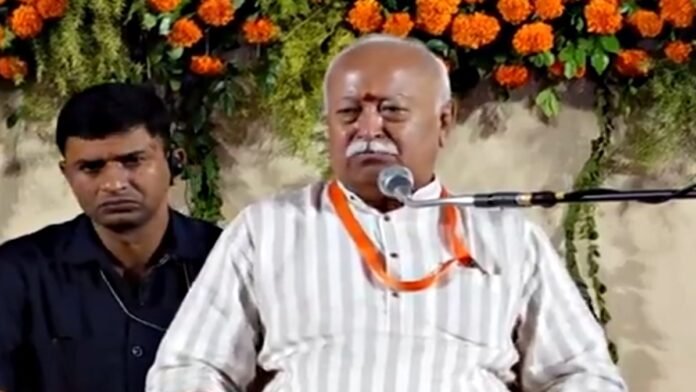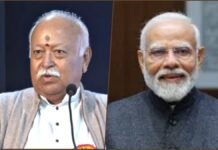
Key Points
- Bhagwat says healthcare and education have drifted from “seva” to profit, hurting the poor and middle class.
- Warns of rising inequality as quality services become unaffordable; families selling assets or taking heavy loans.
- Calls for joint action by government, society, and private sector to restore service ethos and affordability.
- Flags corporate control of hospitals and institutes; urges regulation, transparency, and community-led models.
- Links access to health and education with national development, social harmony, and human capital.
Indore: Speaking at a public event in Indore, RSS chief Mohan Bhagwat said good health and good education have receded from the common person’s reach a trend he called global, not just Indian. He attributed the shift to aggressive commercialization: sectors once anchored in service (seva) now operate on profit-first logic, making quality care and learning prohibitively expensive for large sections of society.
From Seva to Profit
- Then vs now: Bhagwat noted that when health and education were service driven, even the poor accessed them with dignity. Today, bills and fee structures determine who gets treatment or quality schooling.
- Corporate consolidation: Hospitals, schools, and colleges increasingly controlled by large business groups; fee inflation and commercial targets crowd out service orientation.
- Social impact: Families are selling homes, taking on heavy debt, or forgoing essential services. Bhagwat called this a dangerous signal for any society.
Alarming Inequality
Bhagwat warned that limited access for the poor and middle class deepens structural inequality, undermines social mobility, and erodes national capacity. He stressed that universal access to affordable healthcare and quality education is foundational for a modern nation’s growth and social cohesion.
Policy and Society: What He Urged
- Government: Stronger regulation to check predatory pricing; transparent fee frameworks; scholarships; public hospital and school capacity expansion; outcome based accountability.
- Private sector: Recenter “seva,” adopt fair pricing and cross-subsidy models; invest in teacher training, rural outreach, and charitable wings.
- Society/community: Revive trusts, mission hospitals, and not-for-profit schools; local oversight committees; philanthropy aimed at sustainable education and health infrastructure.
Specific Measures He Indicated Are Needed
- Fee rationalization and predictable caps in essential services.
- Expansion of public health insurance coverage and timely claim settlements to reduce out-of-pocket expenses.
- Strengthening government schools and district hospitals with modern equipment, faculty incentives, and performance-linked support.
- Encouraging not-for-profit medical colleges and schools with strict quality norms.
- Digital tools for price transparency, hospital bed availability, and grievance redress.
Broader Framing
Calling the current trend an “alarm bell,” Bhagwat linked the service ethos with India’s civilizational values. He argued that true vikas (development) requires equitable access, not just infrastructure and GDP growth. If the gap persists, “the children of the common man will be deprived of quality education and poor patients will suffer for want of treatment.”
Bhagwat’s Indore remarks push for a reset: regulate where needed, enable where possible, and revive community-led, not-for-profit models so that health and education return to being public-spirited services accessible, affordable, and dignified for all.
















































